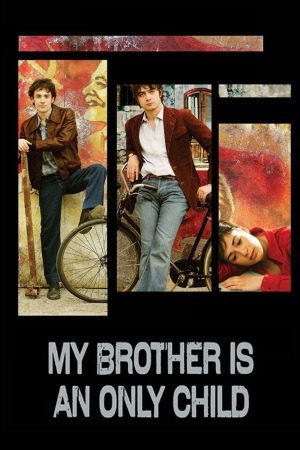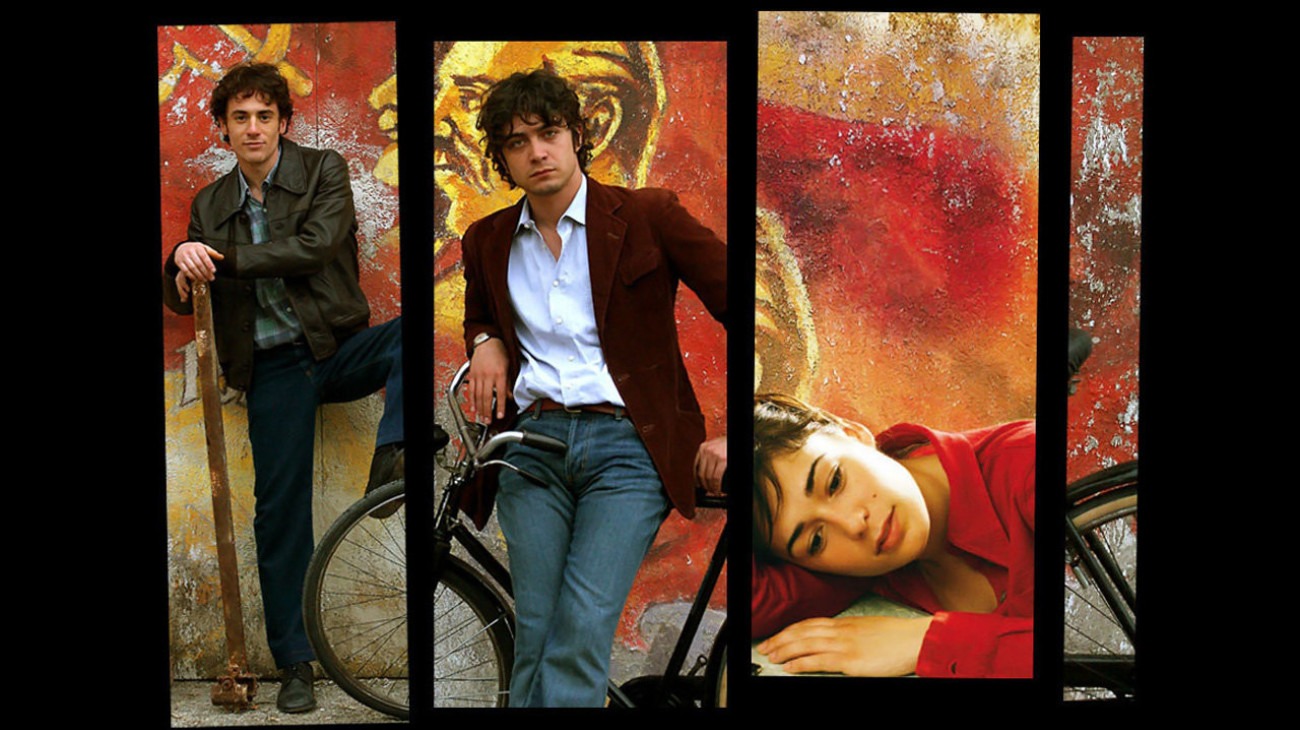
The second-best of youth
My Brother Is an Only Child was co-written by Sandro Petraglia and Stefano Rulli, whose best-known previous work in America was the massive The Best of Youth, and possessing that knowledge colors one's response to the new film, directed and co-written by Daniele Luchetti. Because once that connection has been made, it's almost impossible not to notice that superficially, these are almost exactly the same film: two brothers are torn apart by the political events of the 1960s and early 1970s in Italy, and their family struggle is seen both as a story in and of itself, and a metaphor for the convulsions gripping their country in the decades it took to settle itself down after the fall of Fascism. And from there it's only a small jump to conclude that My Brother, though certainly a worthy film on its on merits, is significantly less engaging and shallower than its six-hour precursor.
The film opens in 1962 in the small Italian town of Latina, about 40 miles from Rome, where teenager Accio Benassi (Vittorio Emanuele Propizio) has just entered a seminary, driven by his extraordinary religious fervor to seek the ascetic life of a Catholic priest. His openly atheistic older brother Manrico (Riccardo Scamarcio) finds the boy's powerful faith to be disturbing and contemptuous, and he brings Accio a photograph of a beautiful actress, knowing full well that teenage hormones will be as they will be, and sure enough hardly any time goes by before Accio removes himself from the seminary, convinced that his frequent... "enjoyment"... of the photograph has left him an unredemptive sinner.
This is the first volley in a pattern that will continue for the rest of the brothers' lives: Manrico shortly joins a radical Communist group, while Accio (grown up and played by Elio Germano, and the casting director here deserves major praise: Germano and Propizio look so much alike that at first I thought I was witnessing the effect of some unusually persuasive aging makeup), still far more conservative and even reactionary than the rest of his family, joins a group dedicated to reinstating the Fascists.
Petraglia, Rulli and Luchetti are clearly more sympathetic to the Left than the Right in their film, but it would be an absolute mistake to suggest that My Brother is Marxist propaganda. Both brothers are clearly shown to be dangerously ideological in their respective pursuits, and while the Fascists are demonised as brutal thugs, the Communists are mocked as the sort of starry-eyed morons who would change the words in Beethoven's Ode to Joy as a form of political protest. The truth, you might say, lies in the middle: with the boys' father (Massimo Popolizio) and especially their mother (Angela Finocchiaro), who voted in a political election just one time in her entire life, and was so disgusted by the complete failure of the politicians to follow through on any of their promises that she has retreated to the small challenges of running a household in a world falling apart.
As themes go, that's not at all deplorable even if it is a touch gutless, but really My Brother isn't much of a political argument at all; even the title suggests its true focus, the years-long emotional battle between two siblings. Exacerbated, unsurprisingly, by a woman: Francesca (Diane Fleri), the ethereal sometime-Communist who dates Manrico on and off while keeping up a healthy flirtation with Accio. It's about as old a story as you'll ever run across, and there comes a time when such things cease to be cliché and transcend in archetypes; so it is in this film. Without doubt, the dynamic has been told in fresher ways in better movies, but there's nothing about My Brother that could be dismissed as failure. It tells a familiar story in a familiar way with conviction and no small amount of talent on both sides of the camera, and that keeps it energetic and watchable, though it's hardly essential.
If the film has a great flaw, it's that Luchetti's vision is a little too moderate, or rather a little too detached from what's going on. Compared to The Best of Youth - to say nothing of the sometimes-frighteningly kinetic films made in Italy during the political struggles of the '60s - My Brother feels mannered and warmed-over; while the personal battles are fairly invigorating (thanks in large part to the extraordinary performances given by Germano and Scamarcio), the world that serves as their backdrop and their metaphoric extension feels a trifle like a museum display. I presume the goal was to achieve a certain bloodless objectivity, but the movie shades into the safe and fairly uninteresting far more often than not. It demonstrates the 1960s without making them come alive.
There's really not a whole lot one can say about the film stylistically. Simply stated, My Brother looks like most every other Italian film of recent vintage: sunny exteriors with lots of evocatively mottled shadows, patently unimaginative editing schemes, and that same handheld camera shtick that seemingly every film director on the Continent has been using like a crutch for a decade or so. I'm not looking to call Luchetti a poor filmmaker; he is very proficient at not being exceptionally imaginative. Which makes him a perfect match for this screenplay, which does everything right except for show us something that we've haven't seen time and time again.
7/10
The film opens in 1962 in the small Italian town of Latina, about 40 miles from Rome, where teenager Accio Benassi (Vittorio Emanuele Propizio) has just entered a seminary, driven by his extraordinary religious fervor to seek the ascetic life of a Catholic priest. His openly atheistic older brother Manrico (Riccardo Scamarcio) finds the boy's powerful faith to be disturbing and contemptuous, and he brings Accio a photograph of a beautiful actress, knowing full well that teenage hormones will be as they will be, and sure enough hardly any time goes by before Accio removes himself from the seminary, convinced that his frequent... "enjoyment"... of the photograph has left him an unredemptive sinner.
This is the first volley in a pattern that will continue for the rest of the brothers' lives: Manrico shortly joins a radical Communist group, while Accio (grown up and played by Elio Germano, and the casting director here deserves major praise: Germano and Propizio look so much alike that at first I thought I was witnessing the effect of some unusually persuasive aging makeup), still far more conservative and even reactionary than the rest of his family, joins a group dedicated to reinstating the Fascists.
Petraglia, Rulli and Luchetti are clearly more sympathetic to the Left than the Right in their film, but it would be an absolute mistake to suggest that My Brother is Marxist propaganda. Both brothers are clearly shown to be dangerously ideological in their respective pursuits, and while the Fascists are demonised as brutal thugs, the Communists are mocked as the sort of starry-eyed morons who would change the words in Beethoven's Ode to Joy as a form of political protest. The truth, you might say, lies in the middle: with the boys' father (Massimo Popolizio) and especially their mother (Angela Finocchiaro), who voted in a political election just one time in her entire life, and was so disgusted by the complete failure of the politicians to follow through on any of their promises that she has retreated to the small challenges of running a household in a world falling apart.
As themes go, that's not at all deplorable even if it is a touch gutless, but really My Brother isn't much of a political argument at all; even the title suggests its true focus, the years-long emotional battle between two siblings. Exacerbated, unsurprisingly, by a woman: Francesca (Diane Fleri), the ethereal sometime-Communist who dates Manrico on and off while keeping up a healthy flirtation with Accio. It's about as old a story as you'll ever run across, and there comes a time when such things cease to be cliché and transcend in archetypes; so it is in this film. Without doubt, the dynamic has been told in fresher ways in better movies, but there's nothing about My Brother that could be dismissed as failure. It tells a familiar story in a familiar way with conviction and no small amount of talent on both sides of the camera, and that keeps it energetic and watchable, though it's hardly essential.
If the film has a great flaw, it's that Luchetti's vision is a little too moderate, or rather a little too detached from what's going on. Compared to The Best of Youth - to say nothing of the sometimes-frighteningly kinetic films made in Italy during the political struggles of the '60s - My Brother feels mannered and warmed-over; while the personal battles are fairly invigorating (thanks in large part to the extraordinary performances given by Germano and Scamarcio), the world that serves as their backdrop and their metaphoric extension feels a trifle like a museum display. I presume the goal was to achieve a certain bloodless objectivity, but the movie shades into the safe and fairly uninteresting far more often than not. It demonstrates the 1960s without making them come alive.
There's really not a whole lot one can say about the film stylistically. Simply stated, My Brother looks like most every other Italian film of recent vintage: sunny exteriors with lots of evocatively mottled shadows, patently unimaginative editing schemes, and that same handheld camera shtick that seemingly every film director on the Continent has been using like a crutch for a decade or so. I'm not looking to call Luchetti a poor filmmaker; he is very proficient at not being exceptionally imaginative. Which makes him a perfect match for this screenplay, which does everything right except for show us something that we've haven't seen time and time again.
7/10






